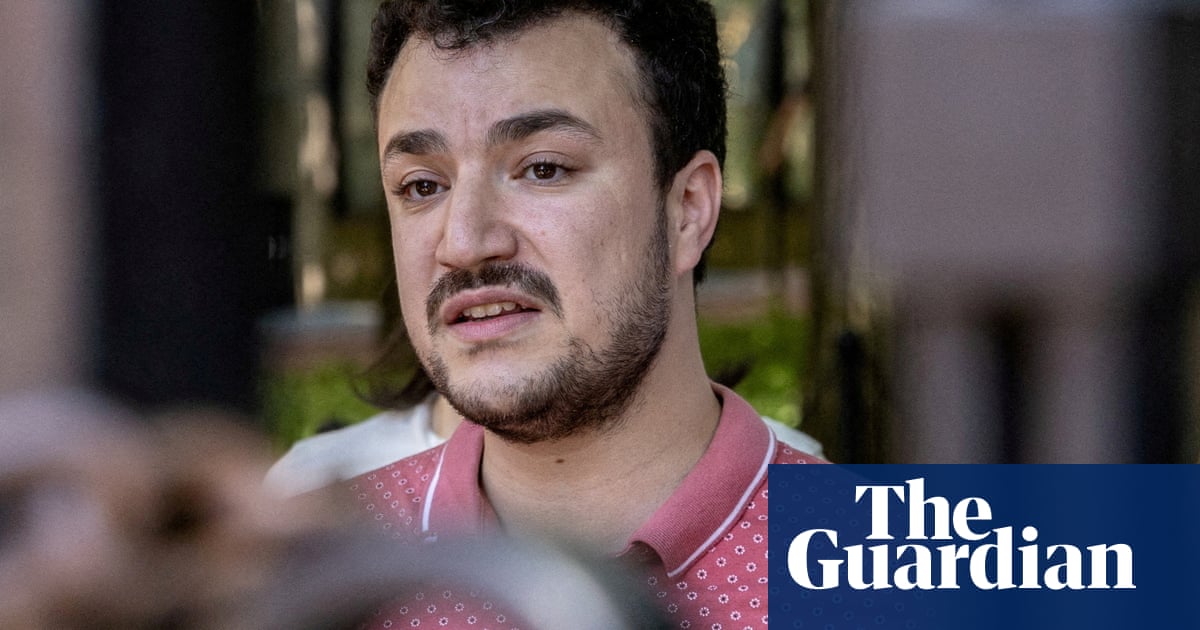Mahmoud Khalil, the detained Columbia University graduate and Palestinian activist, has said in a new court filing that the “most immediate and visceral harms” he has experienced during his nearly three-month detention have been missing the birth of his son and being separated from his wife.
“Instead of holding my wife’s hand in the delivery room, I was crouched on a detention center floor, whispering through a crackling phone line as she labored alone,” Khalil said. “I listened to her pain, trying to comfort her while 70 other men slept around me. When I heard my son’s first cries, I buried my face in my arms so no one would see me weep.
“To not be able to see them, hold them, speak with them freely, enjoy everything I imagined our first days as a family would be like, is devastating,” he wrote about the birth in late April.
The declaration, filed on Wednesday night and made public on Thursday, is part of new evidence submitted by Khalil’s legal team in New Jersey federal court in support of his request for a preliminary injunction requesting his immediate release.
It comes a week aftera US district judge said in a lengthy orderthat the use by the secretary of state, Marco Rubio’, of a rarely invoked law to detain and attempt to deport Khalil was probably unconstitutional.
The judgewrote that the government’s justification for deporting Khalil– that his beliefs may pose a threat toUS foreign policy– could lead to vague and arbitrary enforcement.
The judge, however, stopped short of ordering Khalil’s release, andrequested additional informationbefore ruling further.
On Wednesday night, Khalil’s legal team filed a brief and dozens of declarations and expert reports describing the “irreparable harm”they saythat Khalil “and others will continue to suffer as long as he remains illegally detained in Louisiana and until and unless the Rubio Determination is overturned”.
His attorneys argue that Khalil’s arrest and detention is part of a broader effort by theTrump administrationtosuppress constitutionally protected speechand are challenging Rubio’s determination.
In a letter to the court made public on Thursday, Khalil’s attorneys write that Khalil is suffering “irreparable harm from his arrest and detention” including the “loss of Mr Khalil’s liberty; the chilling of his First Amendment protected activities; the separation from his family, particularly his wife and newborn child; and psychological harm specific to his arrest and detention”.
They also accuse the government of damaging Khalil’s reputation “by baselessly identifying him as a risk to the foreign policy of the United States, marking him and his family as targets for harassment and notoriety and severely undermining his ability to pursue a career in international diplomacy and human rights advocacy”.
In Khalil’s declaration, he says that the harms he has suffered as a result of the government’s actions include “dignitary and reputational harm, personal and familial hardship, including constant fear for personal safety, continued detention, restrictions on my freedom of expression, and severe damage to my professional future”.
At a news conference on Thursday, Veronica Salama, a staff attorney at the New York Civil Liberties Union who is working on Khalil’s case, said that Khalil’s declaration was the “first time” that Khalil “is speaking directly to the court about the harms that he is facing”.
She noted that before his arrest, Khalil had accepted a position at Oxfam International, but that the offer was rescinded on 3 April – a decision she said was a “direct result” of the government’s accusations against him and the public stigma that has followed.
Other filings on Wednesdaynight included letters from attorneys, a declaration from Khalil’s wife, Dr Noor Ramez Abdalla, as well as declarations from students and professors at Columbia University, a former state department official, legal service providers and more.
Abdalla, Khalil’s wife, wrote that the end of her pregnancy and labor “was extremely stressful because I was separated from Mahmoud due to his ongoing detention.
“Though I had immense support from family and friends in those early days, nothing could replace Mahmoud’s presence,” she said. “Those are days our little family will never get back. Mahmoud will never be part of bringing our first baby home from the hospital, awkwardly carrying the baby carrier, and figuring out how to hold such a tiny baby, and all of the other fun, hard, and challenging parts of adjusting to having a newborn. This reality of all we have missed and will never get back is a weight that constantly sits on me.”
The ACLU said on Thursday that Khalil was “still waiting for a full and final ruling on the preliminary injunction motion, in addition to his pending motions for release on bail and for him to be returned to New Jersey”.
The new filings and the news conference on Thursday came a day after Khalil’s case was raised during theNew York City Democratic mayoral primary debate.
The ormer New York governorAndrew Cuomo, the current frontrunner, called Khalil’s detention “a continuation of Trump eroding democracy, chipping away at due process”.
Khalil, Cuomo said, “should be released, he should be released immediately” adding that “he shouldn’t have been detained in the first place.”
The Democratic socialist Zohran Mamdani, who is polling in second place, said that Khalil “should be set free” adding that Khalil “should be at home with his wife Noor and their young child”.
